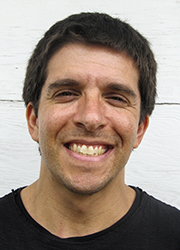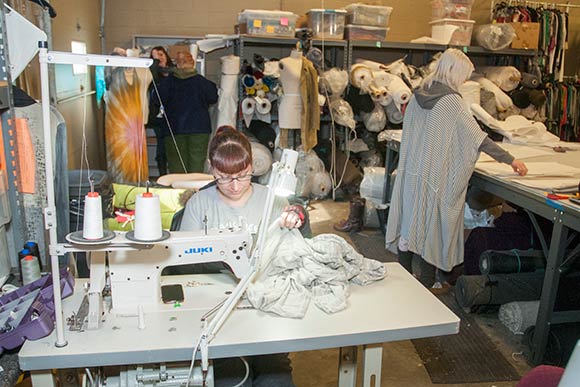Tri-C business program elevates small companies to new levels of success
Solon clothing designer and entrepreneur Rose Corrick went into the Goldman Sachs 10,000 Small Businesses program at Cuyahoga Community College two years ago with a model for growth she believed would increase revenue for her handmade artisan clothing line.
As often occurs in the small business realm, however, things didn't work out exactly as planned. Corrick's original concept for an online retail service that used a different name from her existing Art of Cloth line was eventually integrated into the main company, a move that resulted in a 23 percent uptick in sales.
Though Corrick had to modify her plan, it was 10,000 Small Businesses at Tri-C that taught her the importance of entrepreneurial flexibility, she notes. "I learned to think, analyze, evaluate and make the changes that set us on a revised course for growth," she says. "I ended up using all the tools I'd gained."
 Rose Corrick
Rose Corrick
The Tri-C-affiliated initiative, which shepherds small companies nationwide through workshops, one-on-one advice, mentoring, capital and networking, has been elevating participants to new levels of success since its 2012 launch, proponents say.
The free program has graduated 334 businesses since its inception, representing industries including manufacturing, technology, construction, healthcare and hospitality. These companies currently employ more than 4,500 people and have combined revenues in excess of $300 million.
Breaking down these figures further, 63 percent of grads have experienced revenue growth, with another 47 percent adding jobs since completing the 11-week program designed to help business owners foster economic opportunities, says Joe Gross, director of Tri-C's Goldman Sachs effort.
These revenue and job growth numbers compare favorably with national averages, program backers say. According to the National Small Business Association, 45 percent of like-sized companies nationally added revenue and another 22 percent added jobs over the last 12 months.
"The impact has been fairly dramatic," says Gross. "We have a 99 percent program completion rate in Cleveland, so these are business owners who are seeing the program as a major benefit."
Jobs arising from the initiative are aligning with Northeast Ohio's industry needs, officials say. Skilled manufacturing positions, programmers, web designers and more are being counted into the regional employment ranks.
"The key thing coming out of this is adding jobs and growing businesses," says William Gary, executive vice president of Tri-C's Workforce and Economic Development Division (WEDD), which runs the program on behalf of the college.
Businesses experiencing impact
Through the venture, business-minded attendees are fast-tracked through a management curriculum designed by Babson College, a top-ranked school for entrepreneurial education. Participants learn how to manage money and employees while also gleaning critical knowledge about marketing and leadership from Goldman Sachs' professionals.
 Martina Moore
Martina Moore
Martina Moore is CEO of Moore Counseling & Mediation Services, Inc., an outpatient and mental health treatment center she cofounded with her husband 15 years ago. Moore became interested in 10,000 Small Business in early 2013 upon recognizing the need to evolve her role within the company.
"We started talking (with program administrators), and I realized I was operating as an employee and not an owner," Moore says. "I was in the trenches doing day-to-day work instead of sustaining and building."
The experienced behavioral health care executive joined 10,000 Small Businesses during its second "cohort" in 2013. Following the program's conclusion, Moore "fired" herself as clinical director and hired someone else to fill the position. She also spent three days at the office instead of five, spending her off-site time networking, hunting down new contracts, and immersing herself in balancing the company books.
The endgame of this managerial transformation was 75 percent growth in staff, and a budget that rose from about $350,000 annually to $2.2. million. The increased dollar figure has allowed Moore to provide indigent care for clients as well as open four additional locations, including two in Greater Cleveland.
A happy side effect of 10,000 Small Business has been using cohort colleagues as company resources. Moore picked up an accountant and an attorney through the program's ranks.
"Anytime I'm looking for someone in a particular field, I'll ask someone from my program," she says. "It's been invaluable."
Learning to grow
Fostering peer-to-peer relationships among entrepreneurs is a stated facet of the initiative, says executive director Gross. About 85 percent of program grads end up collaborating, either through direct business transactions or sitting on their colleagues' boards of advisors. Even unrelated companies have something to glean from each other, Gross believes.
"It's about learning from other businesses that have the same issues you do, even if they're working with a different product line," he says.
 Steve Lovelace
Steve Lovelace
"Motivation is a big part of being with other entrepreneurs," says Steven Lovelace, co-founder of HSI Hemodialysis, Inc., a Beachwood-based provider of dialysis products and services. "There's a common bond of determination where everyone wants to be successful."
Lovelace, a 22-year industry veteran, joined the program two years ago in the midst of reconfiguring his management team. "We had lost some business and needed to grow, but we didn't have a growth plan," he explains.
Among the critical information gained during Lovelace's months with 10,000 Small Business was how to approach a bank for a loan and how to find the best people to place on his staff.
"I had the knowledge before, but with he program it was like having a bud that sprouts into a flower," he says. "I learned how to nurture that flower to get it to grow."
HSI has since picked up $2 million in revenue, while extending its sales reach further out of state. "We took on an attitude that we wanted to be top choice in our industry," Lovelace says. "We're not there now, but we're working on it."
Program heads know their own job is far from complete. While vetting candidates for this fall's cohort, they will be tweaking curriculum and searching for ways to include more minority- and women-owned enterprises.
"This initiative is a key part of our workforce development," says Gary of Tri-C. "It exemplifies our commitment to the business community, and we want that to continue."










